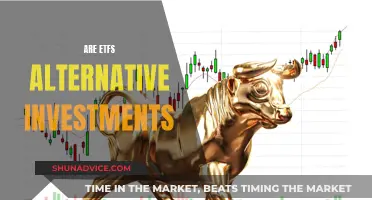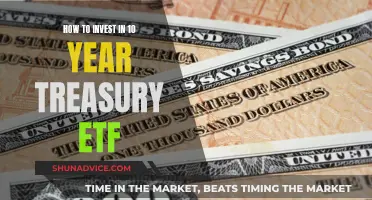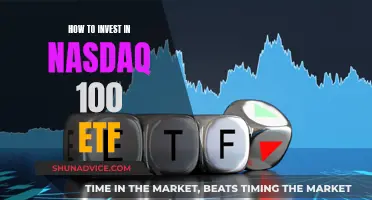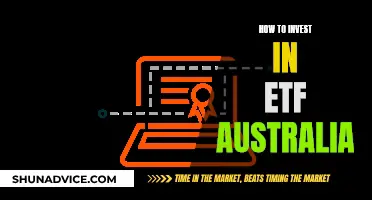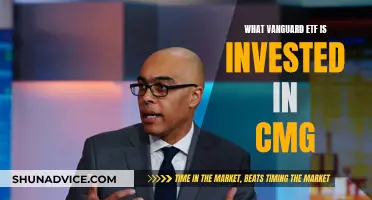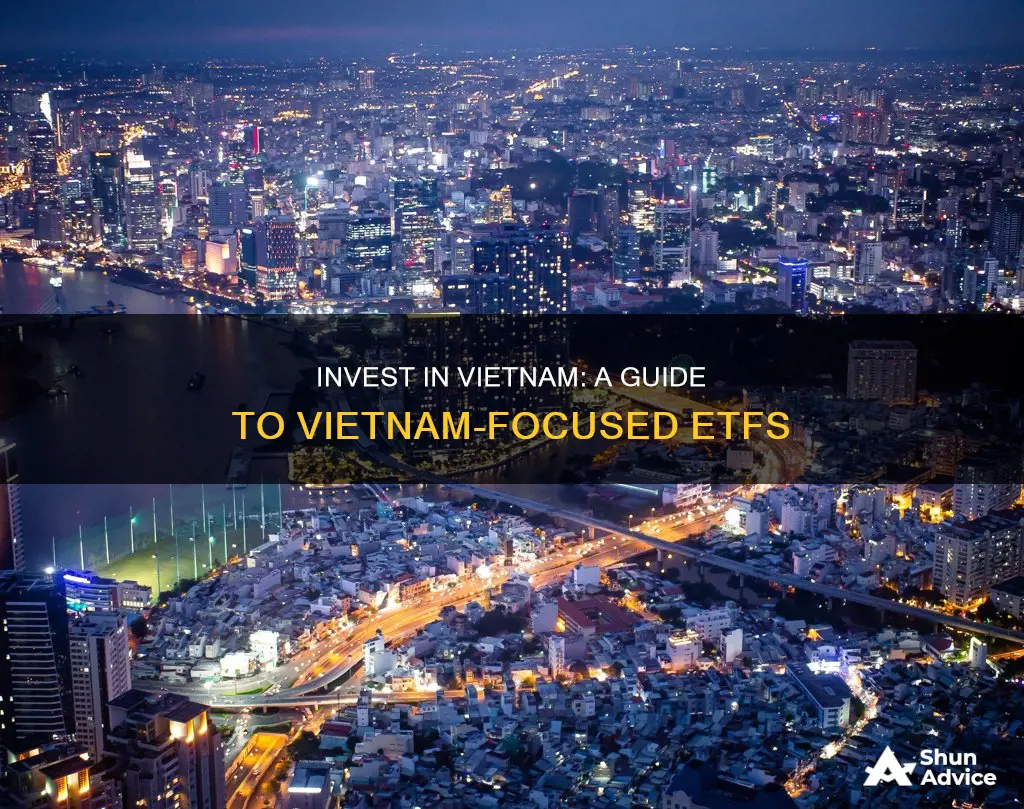
Vietnam's economic growth has slowed in recent years, but the country has strong rebound potential in the post-pandemic era. One way to gain exposure to Vietnam's economy is by investing in a Vietnam-focused exchange-traded fund (ETF). The VanEck Vectors Vietnam ETF (VNM) is one such fund, replicating the price and yield performance of the Market Vectors Vietnam Index. Another option is the VinaCapital VN100 ETF (FUEVN100), which seeks to replicate the performance of the VN100 index, a free-float-adjusted market capitalization-weighted index of the top 100 largest and most liquid stocks listed on the Ho Chi Minh Stock Exchange (HOSE). The Global X MSCI Vietnam ETF (VNAM) is yet another option, investing across the large and mid-cap segments of the Vietnam market.
What You'll Learn

Direct vs. indirect investment options
There are two main ways to invest in Vietnam through ETFs: direct and indirect investment.
Direct investment involves opening an international trading account and buying shares of a Vietnam-focused ETF, such as the VanEck Vectors Vietnam ETF (VNM). This ETF is the first and only fund exclusively focused on Vietnam and offers a pure play on the region. It has a reasonable fee structure, with an expense ratio of 0.59-0.66% as of 2022, and significant assets under management, with nearly $500 million as of 2021. The fund's portfolio is directly focused on publicly traded Vietnamese companies and corporations with at least 50% of their revenues and related assets in Vietnam. However, investing directly in Vietnamese companies can be challenging due to the unique makeup of the country's economy, which is dominated by small and medium-sized ventures.
Indirect investment, on the other hand, involves investing in mutual funds or ETFs that offer exposure to global stocks, including those in Vietnam. One example of an indirect investment option is the iShares MSCI Frontier and Select EM ETF (FM), which is comprised of about 150 established companies in frontier markets. Vietnam represents the second-largest geographic share of this fund's portfolio at 15%, as of 2021. This fund has a slightly higher expense ratio of 0.79%. Another option for indirect investment is the Global X MSCI Vietnam ETF (VNAM), which provides efficient access to a broad basket of Vietnamese securities across the large and mid-cap segments of the market. However, it is important to note that indirect investment options may not offer the same level of direct exposure to Vietnam as the VNM ETF.
Both direct and indirect investment options have their own advantages and considerations. Direct investment through the VNM ETF provides a pure play on Vietnam, but investing directly in Vietnamese companies can be challenging. Indirect investment options, such as the FM ETF and VNAM ETF, offer exposure to a broader range of companies, including those in other frontier markets, but may not provide the same level of direct exposure to Vietnam. Ultimately, the decision between direct and indirect investment depends on an investor's specific goals, risk tolerance, and preferences.
ETFs and Insurance: A Secure Investment Strategy?
You may want to see also

Vietnam's economic growth and market performance
Economic reforms since the launch of Đổi Mới in 1986 have propelled this growth, with real GDP per capita increasing more than sixfold from less than US$700 in 1986 to almost US$4,500 in 2023. The economy is projected to grow at 6.1% in 2024 and 6.5% in 2025, up from 5% in 2023. This growth is driven by increasing global demand and restored domestic consumer confidence.
Vietnam's economy is expected to continue expanding at an annual rate of over 7%, making it one of the fastest-growing in the world. This growth is underpinned by a strong export-oriented manufacturing sector, with electronics making up 38% of exports in 2020. Vietnam has also become a leading agricultural exporter, with rice and coffee being key products.
The country has a young and dynamic population, with roughly 40% under the age of 25, and has made significant progress in education, achieving universal primary education and high enrollment rates in secondary education. Vietnam has also improved access to infrastructure services, with almost 100% of the population using electricity as their main source of lighting as of 2019, up from just 14% in 1993.
However, Vietnam faces challenges such as a rapidly aging population, declining global trade, increasing automation, and environmental degradation. To sustain its economic growth, Vietnam needs to improve policy implementation in areas such as finance, the environment, digital transformation, and poverty reduction.
Despite these challenges, Vietnam's economic outlook remains positive, with its GDP expected to grow at an annual rate of about 6% until 2029. The country has attracted significant foreign investment and is well-positioned to become a manufacturing hub in Asia, particularly for Korean and Japanese firms.
Cocoa ETF: A Sweet Investment Strategy for Your Portfolio
You may want to see also

Top holdings of the VanEck Vietnam ETF
The VanEck Vietnam ETF (VNM) is the only Vietnam-focused exchange-traded fund (ETF) trading in the US. The fund tracks the MVIS Vietnam Index, which reflects the performance of the largest and most liquid companies that operate in Vietnam.
- No Va Land Investment Group Corp: No Va Land Investment Group Corp. (NVL:STC) is a real estate investment firm and one of the largest companies in Vietnam. It is engaged in the business of investing and trading assets, as well as real estate development.
- Vietnam Dairy Products JSC: Vietnam Dairy Products JSC (VNM:STC) is a manufacturer and distributor of dairy products. This company is responsible for a significant portion of Vietnam's dairy production and distribution.
- Feng Tay Enterprise Co Ltd: Feng Tay Enterprise Co Ltd (9910:TAI) is a manufacturer of athletic footwear. The company is based in Taiwan but generates a significant portion of its revenue from Vietnam.
- Eclat Textile Co Ltd: Eclat Textile Co Ltd (1476:TAI) is a company specialising in fabric and garment production. It is based in Taiwan and has a presence in Vietnam's textile industry.
- Saigon Thuong Tin Commercial JSB: Saigon Thuong Tin Commercial Joint Stock Bank (STB:STC) is a commercial bank providing a range of financial services to individuals and corporations.
- Vietjet Aviation JSC: Vietjet Aviation JSC is an aviation company based in Vietnam, offering domestic and international flight services.
These top holdings of the VanEck Vietnam ETF provide a diverse exposure to Vietnam's economy, including real estate, consumer goods, and financial services.
A Beginner's Guide to US ETF Investing
You may want to see also

How to buy VanEck Vectors Vietnam ETF shares in India
Indian investors can buy VanEck Vectors Vietnam ETF (VNM) shares through two modes: direct investment and indirect investment.
Direct Investment
To invest directly, you need to open an International Trading Account with Angel One. Once your account is opened, you can add funds in US dollars to buy VNM shares. You can buy VNM shares the same way you would buy a stock—through a broker or with your advisor.
Indirect Investment
You can also invest indirectly in VNM through mutual funds and Exchange-Traded Funds (ETFs) that offer exposure to global stocks.
Fractional Shares
Yes, you can buy fractional shares of VNM. On the Angel One platform, you can buy global stocks for any dollar value.
About VanEck Vectors Vietnam ETF
The VanEck Vectors Vietnam ETF (VNM) seeks to replicate as closely as possible, before fees and expenses, the price and yield performance of the MVIS Vietnam Index (MVVNMTR). This index includes securities of publicly traded companies that are incorporated in Vietnam or that derive at least 50% of their revenues/related assets from the country.
Schwab ETF Investing: A Beginner's Guide
You may want to see also

VinaCapital VN100 ETF's performance and benefits
VinaCapital VN100 ETF (FUEVN100) is an exchange-traded fund that aims to replicate the performance of the VN100 index. The VN100 is a free-float-adjusted market capitalization-weighted index that measures the performance of the top 100 largest and most liquid stocks listed on the Ho Chi Minh Stock Exchange (HOSE). The ETF's objective is to track and replicate 95% of the VN100 Index while maintaining a tracking error of less than 0.5%.
One of the key benefits of investing in the VinaCapital VN100 ETF is the exposure it provides to large and mid-cap Vietnamese companies. The ETF offers access to 85% of the VN Index, allowing investors to diversify their portfolios and reduce the risk associated with investing in individual stocks. The ETF is also not subject to foreign ownership limits, making it easily accessible to international investors.
Another advantage of the VinaCapital VN100 ETF is its ease of trading. It can be bought and sold daily on the Ho Chi Minh Stock Exchange (HOSE), providing liquidity and convenience to investors. The ETF also has a low management fee of 0.67% of the net asset value per annum, making it a cost-effective option for investors.
The VinaCapital VN100 ETF provides investors with an efficient way to gain exposure to the Vietnamese market and benefit from the potential growth of the country's top companies. By replicating the performance of the VN100 index, the ETF offers a diversified investment strategy that minimizes risk and maximizes potential returns.
A Smart Guide to CPSE ETF FFO Investment
You may want to see also
Frequently asked questions
The VanEck Vietnam ETF (VNM) is the best (and only) Vietnam exchange-traded fund (ETF) trading in the U.S. that is dedicated to the Vietnamese equity market.
As of September 2, 2022, the VanEck Vietnam ETF had a one-year performance of -23.8%, an expense ratio of 0.59%, and an annual dividend yield of 0.34%.
Indian investors can buy the VanEck Vietnam ETF through a direct or indirect investment. A direct investment can be made by opening an International Trading Account with Angel One and adding funds in U.S. dollars. An indirect investment can be made through mutual funds and Exchange-Traded Funds (ETFs) that offer exposure to global stocks.


